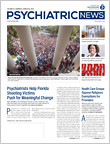In this “post-factual” age of “fake news,” we have become all too familiar with the power of half-truths, opinions, and assertions to take on the appearance of facts. This is not new—medicine has a long history of taking anecdotes and repeating them so frequently that they become accepted dogma. One recent example was the unusual warning added to a 1980s letter to the editor in the
New England Journal of Medicine that purported to show that the risk of iatrogenic addictions from opioid prescriptions is rare, warning that this modest letter has been “
heavily and uncritically cited”.
Most doctors have their pet peeves about something they were told or read in a textbook that might not have stood up to scrutiny. Although this pervades medicine, we consultation-liaison psychiatrists feel particularly drawn to this subject, working as we do between psychiatry and other fields of medicine, and in this interface half-truths and frank misunderstandings seem particularly common.
With this in mind, when the Academy of Psychosomatic Medicine—soon to be the Academy of Consultation-Liaison Psychiatry—was invited by our APA president to present a presidential symposium, I chose to ask representative members to present a favorite example of a myth that they have encountered. I purposely asked psychiatrists at different stages of their careers, so we have both the wisdom of prominent psychiatrists in our field as well as the new experiences of midcareer and younger consultation-liaison psychiatrists.
For example, among leaders of our field, Peter Shapiro, M.D., at Columbia University has devoted much of his career to understanding the interface between cardiology and psychiatry. He will critically review the “accepted” idea that QTc intervals are the best method for predicting whether psychotropics will cause arrhythmias.
Similarly, Sejal Shah, M.D., and in this regard David Gitlin, M.D., will examine whether the belief that psychiatrists are the best suited for performing suicide evaluations is itself a myth.
Alcohol use and abuse seem particularly prone to fake news, and Sparsha Reddy, M.D., will examine the relationship between Wernicke’s encephalopathy and alcohol use, whereas I will take on the age-old question of whether alcohol really kills brain cells.
These are just a few examples of the myths, legends, and “old wives’ tales” that can occur in a field that is both a science and an art. We have no doubt that many members of the audience will have their own examples of things that “just ain’t so,” and we hope to save time to share those as well. ■
“Mythbusters: Consultation-Liaison Doc-tors Separate Medical Fact From Fiction” will be held on Wednesday, May 9, from 8 a.m. to 11 a.m. For location, download the APA Meetings App (see ad below) or check the program guide distributed on site at the meeting.

